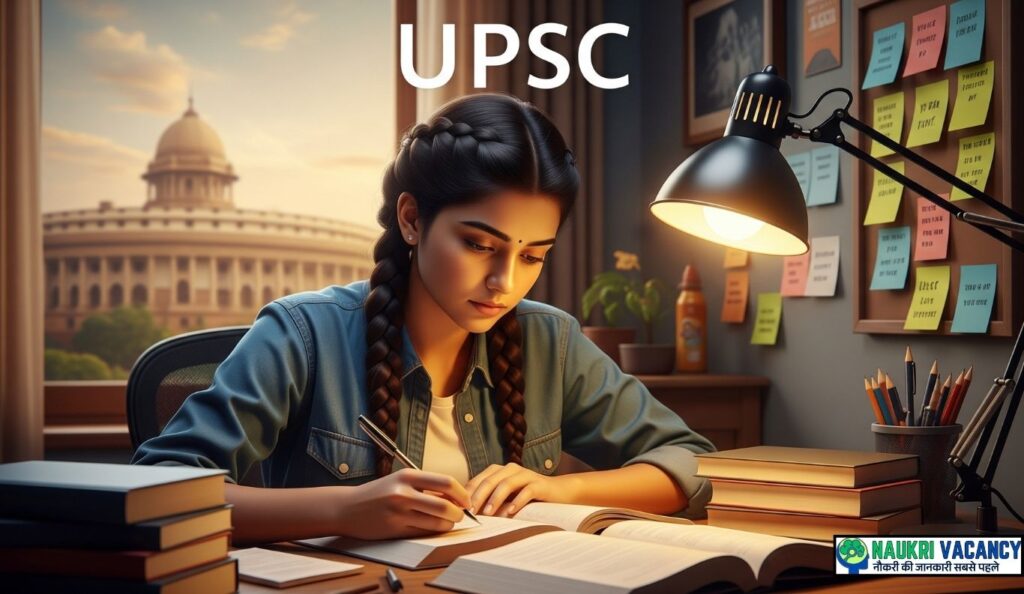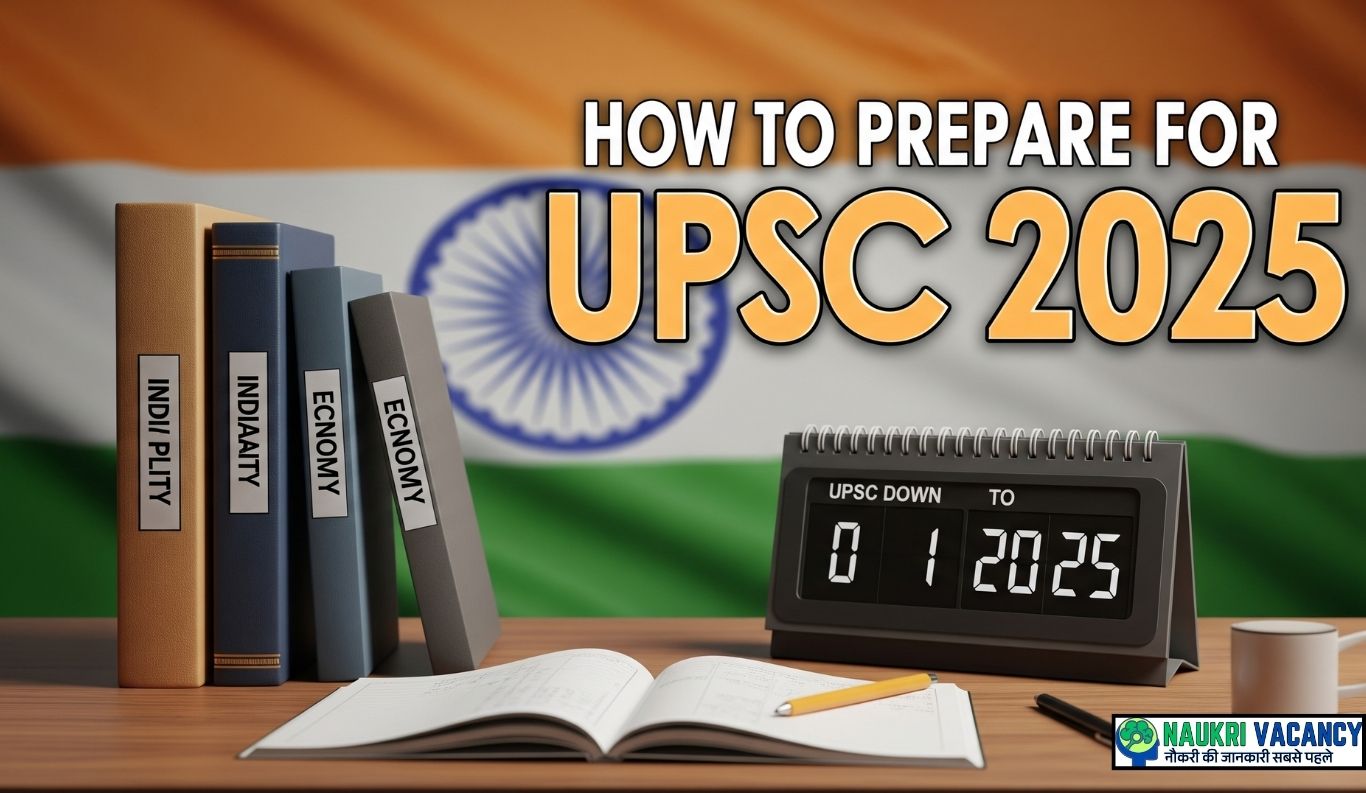UPSC यानी Union Public Service Commission का exam भारत का सबसे बड़ा और सम्मानित exam माना जाता है। अगर आप IAS, IPS, IFS या दूसरी बड़ी सरकारी posts का सपना देखते हैं, तो यह exam आपके लिए वो सुनहरा रास्ता है जो आपके career को नई ऊंचाइयों तक ले जा सकता है। लेकिन UPSC की preparation आसान नहीं है। इसके लिए मेहनत, discipline और सही strategy की जरूरत होती है। अगर आप confuse हैं कि कहाँ से शुरू करें, क्या पढ़ें और कैसे पढ़ें, तो यह पोस्ट आपके लिए perfect है।
इस पोस्ट में हम आपको UPSC exam की complete preparation guide देंगे। हम बताएंगे कि exam का pattern क्या है, syllabus कैसे cover करना है, कौन सी books पढ़नी हैं और time management कैसे करना है। साथ ही, हम daily routine, answer writing, current affairs और interview preparation के tips भी share करेंगे। चाहे आप beginner हों या पहले attempt दे चुके हों, इस पोस्ट में हर किसी के लिए कुछ न कुछ है। तो चलिए, आसान भाषा में शुरू करते हैं और आपके UPSC journey को success की ओर ले चलते हैं।
UPSC Exam क्या है?

UPSC Civil Services Exam भारत में administrative services के लिए आयोजित होता है। यह exam तीन stages में होता है: Prelims, Mains और Interview। Prelims में objective questions होते हैं, Mains में descriptive answers लिखने होते हैं और Interview में personality test होता है। 2025 में UPSC exam का notification जनवरी में आएगा और Prelims मई में होगा। इस exam के जरिए IAS, IPS, IFS, IRS जैसे posts मिलते हैं। हर साल लगभग 10 लाख लोग apply करते हैं, लेकिन सिर्फ 1000-1200 लोग select होते हैं।
UPSC Exam का Pattern
UPSC exam को समझने के लिए इसका pattern जानना जरूरी है।
- Prelims:
- दो papers: General Studies (GS) और CSAT (Civil Services Aptitude Test)।
- GS में 100 questions (200 marks) और CSAT में 80 questions (200 marks)।
- दोनों papers objective type के होते हैं।
- Negative marking: हर गलत जवाब के लिए 1/3 marks कटते हैं।
- CSAT सिर्फ qualifying है (33% marks चाहिए)।
- Mains:
- 9 papers: 4 GS papers, 2 optional subject papers, 1 essay paper, 2 language papers (English और Hindi/Regional Language)।
- Total 1750 marks।
- Language papers qualifying हैं।
- Interview:
- 275 marks।
- Personality, communication और decision-making skills test होती हैं।
Syllabus को समझें
UPSC का syllabus बहुत बड़ा है, लेकिन इसे small parts में divide करके आसानी से cover किया जा सकता है। यहाँ main topics हैं:
- Prelims GS Syllabus:
- History: Ancient, Medieval, Modern India, Freedom Struggle।
- Geography: Physical, Indian, World Geography।
- Polity: Constitution, Governance, Panchayati Raj।
- Economy: Basic concepts, Budget, Economic Survey।
- Environment: Ecology, Biodiversity, Climate Change।
- Science & Technology: Basic science, recent developments।
- Current Affairs: National और International events।
- CSAT Syllabus:
- Comprehension, Logical Reasoning, Basic Maths, Data Interpretation।
- Mains Syllabus:
- GS 1: Indian Heritage, Culture, History, Geography।
- GS 2: Governance, Constitution, International Relations।
- GS 3: Technology, Economic Development, Environment, Security।
- GS 4: Ethics, Integrity, Aptitude।
- Essay: Contemporary issues, philosophical topics।
- Optional Subject: History, Geography, Public Administration, Sociology आदि।
Step-by-Step Preparation Strategy
UPSC की preparation को आसान बनाने के लिए यहाँ step-by-step guide है।
1. Basics से शुरू करें
अगर आप beginner हैं, तो NCERT books से पढ़ाई शुरू करें। ये books 6th से 12th class तक की हैं और UPSC syllabus की foundation बनाती हैं।
- History: NCERT Class 6-12 (Old NCERTs for Modern History)।
- Geography: NCERT Class 6-12 (Focus on Physical और Indian Geography)।
- Polity: NCERT Class 9-12, Laxmikanth’s Indian Polity।
- Economy: NCERT Class 11-12, Ramesh Singh’s Indian Economy।
- Environment: Shankar IAS Environment book।
हर subject के लिए 1-2 standard books चुनें और बार-बार revise करें।
2. Current Affairs की आदत डालें
UPSC में current affairs बहुत important हैं। रोज newspaper पढ़ें जैसे The Hindu या Indian Express। Monthly magazines जैसे Yojana, Kurukshetra और Vision IAS monthly compilation पढ़ें। Apps जैसे PIB और Jagran Josh भी use करें।
- Daily Routine: 1-2 घंटे current affairs के लिए रखें।
- Notes बनाएं: Events, policies और international news के short notes बनाएं।
- Focus Areas: Government schemes, international summits, economic updates।
3. Time Management
UPSC की preparation में time management सबसे बड़ी challenge है। यहाँ sample timetable है:
- Morning (6 AM – 9 AM): NCERT reading या static syllabus।
- Mid-Morning (10 AM – 1 PM): Current Affairs और newspaper।
- Afternoon (2 PM – 5 PM): Optional subject या GS topics।
- Evening (6 PM – 9 PM): Answer writing practice और CSAT।
- Night (10 PM – 11 PM): Revision और notes।
हर हफ्ते 1 दिन revision के लिए रखें।
4. Answer Writing Practice
Mains exam में answer writing बहुत जरूरी है। रोज 2-3 questions की practice करें।
- Structure: Intro, Body, Conclusion।
- Word Limit: 150-250 words per answer।
- Tips: Examples, data और diagrams use करें। Clear और concise लिखें।
- Resources: Vision IAS Mains Test Series, Previous Year Questions।
5. Mock Tests
Prelims और Mains दोनों के लिए mock tests दें। इससे exam pattern समझ आएगा और confidence बढ़ेगा।
- Prelims: Vision IAS, Insights, Forum IAS test series।
- Mains: Mains test series join करें। Feedback लें और improve करें।
- Frequency: हफ्ते में 1-2 mock tests दें।
6. Optional Subject का चयन
Optional subject का सही चयन success की key है। Popular optional subjects हैं:
- History, Geography, Public Administration, Sociology, Political Science।
- Tips:
- ऐसा subject चुनें जिसमें आपका interest हो।
- Study material और coaching availability चेक करें।
- Previous year papers देखें।
7. CSAT Preparation
CSAT को lightly न लें। इसमें qualifying marks (33%) लाना जरूरी है।
- Books: RS Aggarwal (Quantitative Aptitude), Arihant CSAT book।
- Focus: Comprehension, Logical Reasoning, Basic Maths।
- Practice: रोज 1 घंटा CSAT के लिए दें।
8. Interview Preparation
Interview में personality और confidence test होता है।
- Tips:
- DAF (Detailed Application Form) अच्छे से fill करें।
- Current affairs और optional subject revise करें।
- Mock interviews join करें।
- Communication skills improve करें।
Recommended Books
यहाँ कुछ standard books की list है:
- History:
- Bipan Chandra’s India’s Struggle for Independence।
- Spectrum’s Modern History।
- Polity:
- M. Laxmikanth’s Indian Polity।
- Geography:
- GC Leong’s Physical Geography।
- Oxford Atlas।
- Economy:
- Ramesh Singh’s Indian Economy।
- Economic Survey।
- Environment:
- Shankar IAS Environment।
- Current Affairs:
- The Hindu newspaper।
- Yojana magazine।
Daily Routine for UPSC
UPSC की preparation में consistency बहुत जरूरी है। यहाँ daily routine का example है:
- 6 AM: Wake up और exercise।
- 7 AM – 9 AM: NCERT या static subject।
- 10 AM – 12 PM: Newspaper और current affairs।
- 1 PM – 3 PM: Optional subject।
- 4 PM – 6 PM: GS topics (Polity, Economy आदि)।
- 7 PM – 9 PM: Answer writing या CSAT।
- 10 PM: Revision और notes।
Challenges और Solutions
UPSC preparation में कई challenges आते हैं। यहाँ कुछ solutions हैं:
- Challenge: Syllabus बहुत बड़ा।
- Solution: Topics को small parts में divide करें। Priority-wise पढ़ें।
- Challenge: Time की कमी।
- Solution: Timetable बनाएं और strictly follow करें।
- Challenge: Motivation कम होना।
- Solution: Success stories पढ़ें। Study group join करें।
Women Candidates के लिए Tips
Women candidates को age relaxation और fee में छूट मिलती है। साथ ही, UPSC में women toppers की संख्या बढ़ रही है। Confidence और focus रखें। Coaching या online resources use करें।
Online Resources
- YouTube Channels: Unacademy, Study IQ, Vision IAS।
- Apps: BYJU’S, Drishti IAS, Vision IAS।
- Websites: PIB, PRS India।
Common Mistakes और कैसे बचें
- Mistake: बहुत सारी books पढ़ना।
- Solution: Limited books चुनें और revise करें।
- Mistake: Current affairs ignore करना।
- Solution: रोज newspaper पढ़ें।
- Mistake: Answer writing की practice न करना।
- Solution: रोज 2-3 answers लिखें।
Motivation और Mindset
UPSC की journey लंबी और tough है। लेकिन सही mindset से आप इसे enjoy कर सकते हैं।
- Positive Thinking: खुद पर belief रखें।
- Small Goals: Daily और weekly targets set करें।
- Breaks: Overstudy से बचें। हफ्ते में 1 दिन relax करें।
- Inspiration: Toppers के interviews देखें।
2025 Exam Details
- Notification: जनवरी 2025।
- Prelims: मई 2025।
- Mains: सितंबर 2025।
- Interview: मार्च-अप्रैल 2026।
- Vacancies: 1000+ (expected)।
Extra Tips for Success
- Health: अच्छा खाना खाएं। Yoga या meditation करें।
- Study Group: Friends के साथ discussion करें।
- Revision: Short notes बनाएं और monthly revise करें।
- Confidence: Exam hall में calm रहें। Questions carefully पढ़ें।
Conclusion
UPSC exam आपके सपनों को सच करने का रास्ता है। यह journey मुश्किल है, लेकिन नामुमकिन नहीं। इस पोस्ट में हमने आपको complete preparation strategy दी है – syllabus से लेकर books, time management और motivation तक। अब action लेने की बारी आपकी है। आज से पढ़ाई शुरू करें, timetable बनाएं और daily मेहनत करें। आपका dedication और hard work आपको IAS, IPS या IFS बनाएगा। All the best!

मैं Naukrivacancy.com का संस्थापक हूँ। 3 वर्षों से नौकरी और करियर विषयों पर ब्लॉगिंग कर रहा हूँ। मेरा उद्देश्य युवाओं को सही जानकारी देना है। हम पहले ऑफिशियल साइट से जानकारी चेक करते हैं, फिर प्रकाशित करते हैं ताकि आप गलत सूचना से बच सकें। हमारी टीम दिन-रात मेहनत करती है ताकि आपको सही समय पर सटीक और भरोसेमंद जानकारी मिले। ग्रेजुएट, 12वीं पास या अन्य योग्यता वाले युवाओं के लिए हमारे पास हर तरह की नौकरी की जानकारी है।
